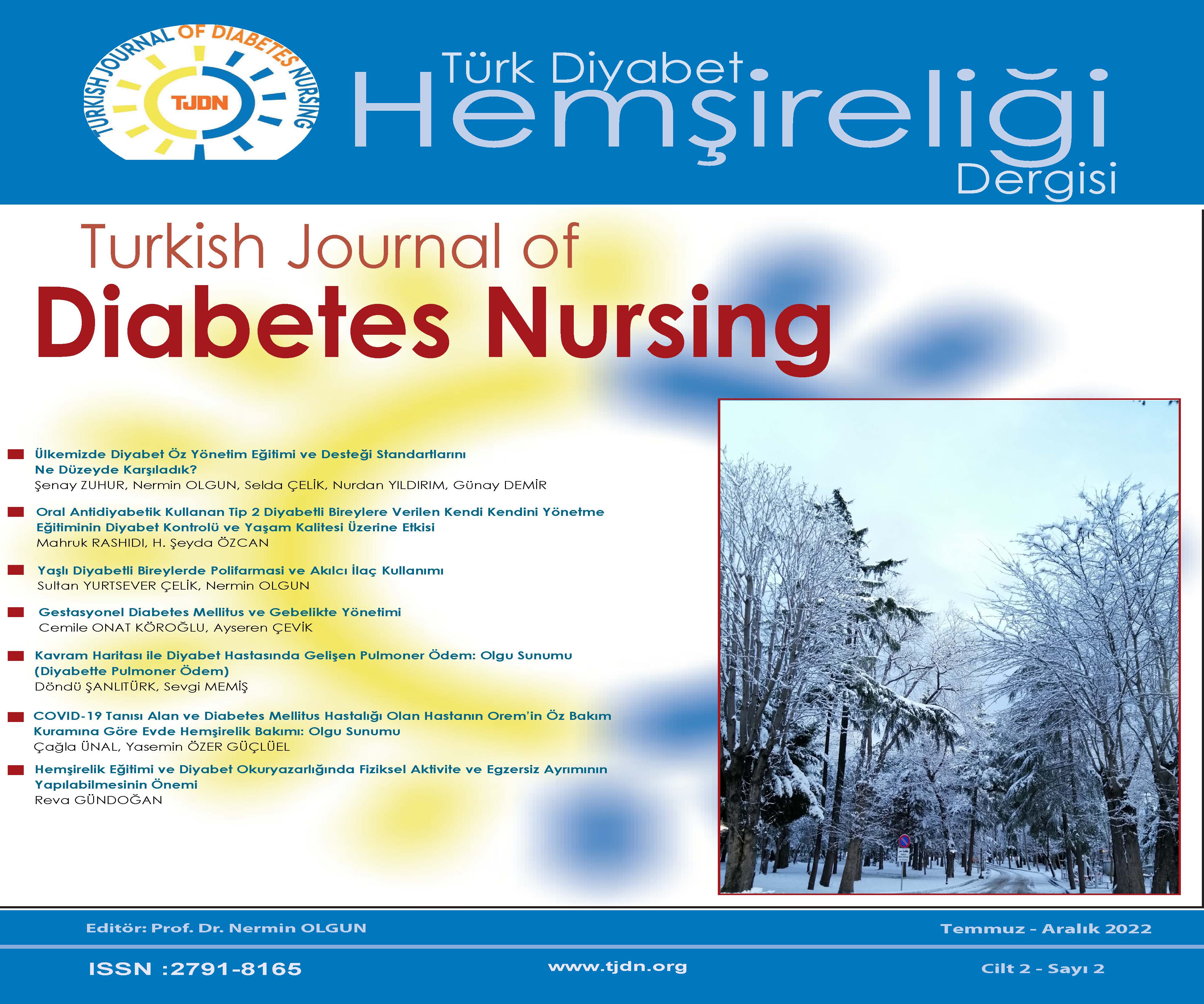Oral Antidiyabetik Kullanan Tip 2 Diyabetli Bireylere Verilen Kendi Kendini Yönetme Eğitiminin Diyabet Kontrolü ve Yaşam Kalitesi Üzerine Etkisi
Author :
Abstract
Amaç: Bu çalışma, oral antidiyabetik kullanan tip 2 diyabetli bireylere verilen kendi kendini yönetme eğitiminin diyabet kontrolü ve diyabet kontrolünü etkileyen faktörler üzerine etkisini belirlemek amacıyla yapıldı.
Yöntem: Randomize kontrollü ve deneysel araştırma deseninde yürütülen çalışma, İstanbul’daki bir eğitim ve araştırma hastanesinin diyabet polikliniğinde izlenen ve oral antidiyabetik kullanan tip 2 diyabetli bireylerle gerçekleştirildi. Araştırmanın örneklemi eğitim grubunda 31, kontrol grubunda 30 olmak üzere toplam 61 bireyden oluştu. Veriler; Hasta Bilgi Formu, Diyabet Tedavisinden Memnuniyet Anketi, Hasta Sağlık Anketi (PHQ-9), EuroQoL Genel Yaşam Kalitesi Ölçeği (EQ-5D-5L) ve Diyabette Öz Yönetim Algısı Skalası (DÖYAS) kullanılarak toplandı. Eğitim grubundaki diyabetli bireylere araştırmacılar tarafından geliştirilen ve toplam 7 modülden oluşan, bir gün süren Kendi Kendini Yönetme Eğitimi uygulandı. İlk değerlendirmeden 1 ay ve 3 ay sonra her iki gruptaki ölçümler tekrarlandı.
Bulgular: Eğitim grubunun HbA1c değerlerinin eğitim öncesi değerine göre 1. ay ve 3. ay sonunda (F=4,339; p=0,022) ve Beden Kütle İndeksi (BKİ) değerlerinin (F=3,907; p=0,031), hipoglisemi yaşama deneyimlerinin (F=4,805; p=0,016) giderek anlamlı olarak azaldığı görülürken kontrol grubunda ise anlamlı bir değişimin olmadığı saptandı. Eğitim grubundaki katılımcıların diyabet tedavisinden memnuniyet düzeylerinin ise istatistiksel olarak ileri derecede anlamlı bir artış (F=9,793; p=0,001) göstermiştir.
Sonuç: Eğitim sonrasında eğitim grubunun kontrol grubuna göre 1 ayda ve 3 ayda HbA1c ve BKİ değerlerinin, hipoglisemi yaşama deneyimlerinin ve depresyon düzeyinin azaldığı belirlenmiştir. Yaşam kalitesi ve depresyon yaşama düzeyinin ve diyabet memnuniyet ölçeği ve sağlık anketinin her hasta için ölçülmesi, diyabet hastaların eğitiminde klasik eğitim yöntemlerinin yanında diyabet sohbet haritaları ile planlanan eğitim modelleri gibi etkin hasta katılımının sağlandığı eğitimlerin uygulanması önerilir.
Keywords
Abstract
Objective: This study was conducted to determine the effect of self-management training given to individuals with type 2 diabetes using oral antidiabetic drugs on diabetes control and the factors affecting diabetes control.
Method(s): The study, which was carried out in a randomized controlled and experimental research design to determine the effect of self-management training given to individuals with type 2 diabetes using oral anti-diabetics on diabetes control and the factors affecting diabetes control, was conducted in a training and research hospital in İstanbul The study was carried out with individuals with type 2 diabetes who were followed up in the diabetes outpatient clinic andwere using oral antidiabetics. The sample of the research; consisted of a total of 61 individuals, 31 of whom were training and 30 were in control group. Before the study, a data collection form was applied to all individuals. On the other hand, the effects of education on diabetes control and quality of life were examined with the Diabetes Treatment Satisfaction Questionnaire, the Patient Health Questionnaire (PHQ-9), the EuroQoL General Quality of Life Scale (EQ-5D-5L), and the Diabetes Self-Management Perception Scale (DÖYAS). A one-day Self-Management Training consisting of 7 modules, developed by the researchers, was applied to individuals with diabetes in the training group. Measurements in both groups were repeated 1 month and 3 months after the first evaluation.
Result(s): According to the pre-training value of the HbA1c values (F=4.339; p=0.022) of the training group, at the end of the 1st and 3rd months and Body Mass Index (BMI) values (F=3.907; p=0.031), hypoglycemia experiences (F=4.805) ; p=0.016), it was observed that it gradually decreased significantly, while there was no significant change in the control group.
Conclusion(s): After the training, it was determined that the HbA1c and BMI values, hypoglycemia and depression levels of the training group decreased at 1 month and 3 months compared to the control group. It is important to measure the quality of life and the level of depression and the diabetes satisfaction scale and health questionnaire for each patient. In addition to the classical education methods in the education of diabetes patients, it is recommended to implement trainings that provide effective patient participation, such as diabetes chat maps and planned education models.





